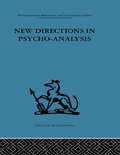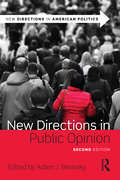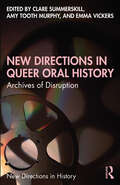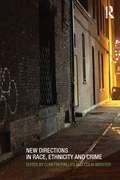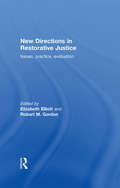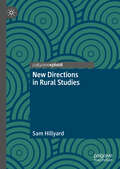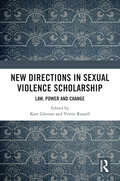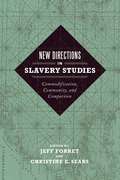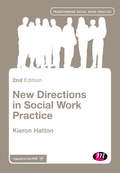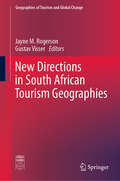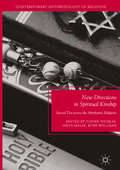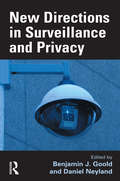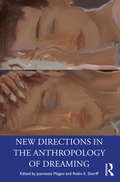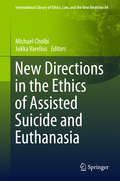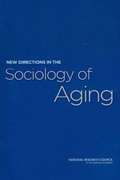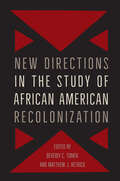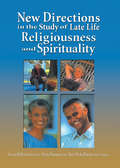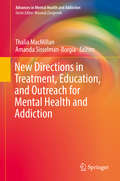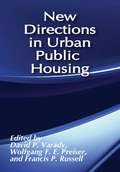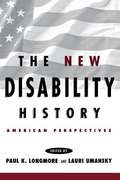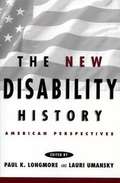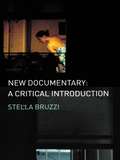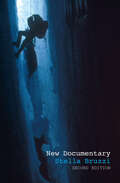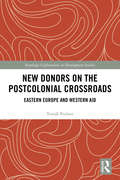- Table View
- List View
New Directions in Psycho-Analysis: The significance of infant conflict in the pattern of adult behaviour
by Melanie Klein Paula Heimann R E Money-KyrleTavistock Press was established as a co-operative venture between the Tavistock Institute and Routledge & Kegan Paul (RKP) in the 1950s to produce a series of major contributions across the social sciences. This volume is part of a 2001 reissue of a selection of those important works which have since gone out of print, or are difficult to locate. Published by Routledge, 112 volumes in total are being brought together under the name The International Behavioural and Social Sciences Library: Classics from the Tavistock Press. Reproduced here in facsimile, this volume was originally published in 1955 and is available individually. The collection is also available in a number of themed mini-sets of between 5 and 13 volumes, or as a complete collection.
New Directions in Public Opinion (New Directions in American Politics)
by Adam J. BerinskyThe field of public opinion is one of the most diverse in political science. Over the last 60 years, scholars have drawn upon the disciplines of psychology, economics, sociology, and even biology to learn how ordinary people come to understand the complicated business of politics. But much of the path-breaking research in the field of public opinion is published in journals, taking up fairly narrow questions one at a time and often requiring advanced statistical knowledge to understand these findings. As a result, the study of public opinion can seem confusing and incoherent to undergraduates. To engage undergraduate students in this area, a new type of textbook is required. The second edition of New Directions in Public Opinion brings together leading scholars to provide an accessible and coherent overview of the current state of the field of public opinion. Each chapter provides a general overview of topics that are at the cutting edge of study as well as well-established cornerstones of the field. Each contributor has made substantive revisions to their chapters, and three chapters have been added on genetics and biology, immigration, and political extremism and the Tea Party. Suitable for use as a main textbook or in tandem with a lengthier survey, this book comprehensively covers the topics of public opinion research and pushes students further to explore critical topics in contemporary politics.
New Directions in Queer Oral History: Archives of Disruption (New Directions in History)
by Clare Summerskill Amy Tooth Murphy Emma VickersThis comprehensive international collection reflects on the practice, purpose, and functionality of queer oral history, and in doing so demonstrates the vibrancy and innovation of this rapidly evolving field. Drawing on the roots of oral history’s original commitment to "history from " queer oral history has become an indispensable methodology at the heart of queer studies. Expanding and extending the existing canon, this book offers up key observations about queer oral history as a methodology, and how it might be advanced through cutting edge approaches. The collection contains a mix of contributions from established scholars, early career researchers, postgraduate students, archivists, and activists, ensuring its accessibility and wide appeal. The go-to reference for queer oral history for scholars, undergraduate and postgraduate students, and community-engaged practitioners, New Directions in Queer Oral History advances rigorous methodological and theoretical debates and constitutes a significant intervention in the world of oral history.
New Directions in Race, Ethnicity and Crime
by Coretta Phillips Colin WebsterThe disproportionate criminalisation and incarceration of particular minority ethnic groups has long been observed, though much of the work in criminology has been dominated by a somewhat narrow debate. This debate has concerned itself with explaining this disproportionality in terms of structural inequalities and socio-economic disadvantage or discriminatory criminal justice processing. This book offers an accessible and innovative approach, including chapters on anti-Semitism, social cohesion in London, Bradford and Glasgow, as well as an exploration of policing Traveller communities. Incorporating current empirical research and new departures in methodology and theory, this book also draws on a range of contemporary issues such as policing terrorism, immigration detention and youth gangs. In offering minority perspectives on race, crime and justice and white inmate perspectives from the multicultural prison, the book emphasises contrasting and distinctive influences on constructing ethnic identities. It will be of interest to students studying courses in ethnicity, crime and justice.
New Directions in Restorative Justice
by Elizabeth Elliott Robert M. GordonThis book addresses a number of key themes and developments in restorative justice, and is based on papers originally presented at the 6th International Conference on Restorative Justice in Vancouver. It is concerned with several new areas of practice within restorative justice, with sections on restorative justice and youth, aboriginal justice and restorative justice, victimization and restorative justice, and evaluating restorative justice. Contributors to the book are drawn from leading experts in the field from the UK, US, Europe, Canada, Australia and New Zealand.
New Directions in Rural Studies
by Sam HillyardUsing theory and method, this book seeks to critique and illuminate rural matters. Rural issues are tenacious and contested, as we continue to value the green and pleasant land, but in a rose-tinted way. The opening chapter provides a contextualising discussion of the new ways rurality has been conceptualised. Critical debates by leading scholars in recent years have expressed concern about the direction of travel inside rural areas and also with associated academic disciplines. These are overviewed and evaluated, as are the general trends in rural scholarship. This chapter then frames subsequent chapters on substantive areas of rural studies – both benign and contested. The subsequent chapters unpack specific issues through original case studies, illuminating the contemporary rural. They are the green wellbeing zeitgeist, narrowed to focus upon gardening, and at the other extreme the more emotive issue of country sports and live quarry game shooting. A third and final substantive chapter offers new empirical evidence of a rural coastal community experiencing acute healthcare needs. Offering original case studies that illuminate and inform new theoretical ideas around the rural, this book is essential reading for academics and students across disciplines interested in rural matters.
New Directions in Sexual Violence Scholarship: Law, Power and Change
by Kate Gleeson and Yvette RussellThis edited collection brings together leading and emerging scholars in the important field of sexual violence scholarship. The last ten years have witnessed an international reckoning on sexual violence, typified in the mainstream imagination by the #MeToo movement, acknowledgement of the violence of university campus life, and the overdue recognition of the enduring harms of child sexual abuse. While the state has been forced to respond through law and other political processes, at times revealing its agility and at other times its archaic investment in the past, much of the real work responding to sexual violence and abuse has taken place within communities, and in the personal responses of the individuals writing the scripts of their experiences. This volume explores the nuances of these individual experiences and considers how they are shaped and reflected by intersecting axes of power including gender, race, class, age and able-bodied status. It reflects on law and law reform in the area and suggests new modes and frames through which to explain and understand sexual violence and institutional responses to it. Debates within this contested personal and political arena do not map onto longstanding binaries of liberal and radical feminism, nor conservative and progressive politics. This interdisciplinary volume traces that murky terrain and features some of the leading international scholars writing on sexual violence in English today. This book will appeal to scholars and students across the broad disciplines of law and legal studies; criminology; gender studies; political science and sociology.
New Directions in Slavery Studies: Commodification, Community, and Comparison
by Jeff Forret Christine E. SearsIn this landmark essay collection, twelve contributors chart the contours of current scholarship in the field of slavery studies, highlighting three of the discipline's major themes--commodification, community, and comparison--and indicating paths for future inquiry. New Directions in Slavery Studies addresses the various ways in which the institution of slavery reduced human beings to a form of property. From the coastwise domestic slave trade in international context to the practice of slave mortgaging to the issuing of insurance policies on slaves, several essays reveal how southern whites treated slaves as a form of capital to be transferred or protected. An additional piece in this section contemplates the historian's role in translating the fraught history of slavery into film. Other essays examine the idea of the "slave community," an increasingly embattled concept born of revisionist scholarship in the 1970s. This section's contributors examine the process of community formation for black foreigners, the crucial role of violence in the negotiation of slaves' sense of community, and the effect of the Civil War on slave society. A final essay asks readers to reassess the long-standing revisionist emphasis on slave agency and the ideological burdens it carries with it. Essays in the final section discuss scholarship on comparative slavery, contrasting American slavery with similar, less restrictive practices in Brazil and North Africa. One essay negotiates a complicated tripartite comparison of secession in the United States, Brazil, and Cuba, while another uncovers subtle differences in slavery in separate regions of the American South, demonstrating that comparative slavery studies need not be transnational. New Directions in Slavery Studies provides new examinations of the lives and histories of enslaved people in the United States.
New Directions in Social Work Practice (Transforming Social Work Practice Series)
by Kieron HattonThis book investigates the main influences shaping social work practice now and in the future. Aimed at second and third year undergraduates and postgraduates, it looks at current developments such as the rise of the service user movement and the influence of European perspectives. In addition, it draws on national policy developments including Every Child Matters, Valuing People and Common Assessment Frameworks. It also develops themes around interprofessional/multi-agency work, common learning and enhancing the voluntary sector’s role in service delivery. Supported by activities and case studies, it is an excellent follow-on to the Learning Matters title, 'What is Social Work?'
New Directions in South African Tourism Geographies (Geographies of Tourism and Global Change)
by Jayne M. Rogerson Gustav VisserThis book provides an overview of innovative and new directions being chartered in South African tourism geographies. Within the context of global change the volume explores different facets and different geographies of tourism. Key themes under scrutiny include the sharing economy, the changing accommodation service sector, touring poverty, tourism and innovation, tourism and climate change, threats to sustainability, inclusive tourism and a number of studies which challenge the present-mindedness of much tourism geographical scholarship. The 18 chapters range across urban and rural landscapes in South Africa with sectoral studies which include adventure tourism, coastal tourism, cruise tourism, nature-based tourism, sports tourism and wine tourism. Finally, the volume raises a number of policy and planning issues in the global South in particular relating to sustainability, local economic development and poverty reduction. Outlining the impact of tourism expansion in South Africa and suggesting future research directions, this stimulating book is a valuable resource for geographers as well as researchers and students in the field of tourism studies.
New Directions in Spiritual Kinship
by Todne Thomas Asiya Malik Rose WellmanThis volume examines the significance of spiritual kinship--or kinship reckoned in relation to the divine--in creating myriad forms of affiliations among Christians, Jews, and Muslims. Rather than confining the study of spiritual kinship to Christian godparenthood or presuming its disappearance in light of secularism, the authors investigate how religious practitioners create and contest sacred solidarities through ritual, discursive, and ethical practices across social domains, networks, and transnational collectives. This book's theoretical conversations and rich case studies hold value for scholars of anthropology, kinship, and religion.
New Directions in Spiritual Kinship: Sacred Ties across the Abrahamic Religions (Contemporary Anthropology of Religion)
by Todne Thomas Asiya Malik Rose WellmanThis volume examines the significance of spiritual kinship—or kinship reckoned in relation to the divine—in creating myriad forms of affiliations among Christians, Jews, and Muslims. Rather than confining the study of spiritual kinship to Christian godparenthood or presuming its disappearance in light of secularism, the authors investigate how religious practitioners create and contest sacred solidarities through ritual, discursive, and ethical practices across social domains, networks, and transnational collectives. This book’s theoretical conversations and rich case studies hold value for scholars of anthropology, kinship, and religion.
New Directions in Surveillance and Privacy
by Daniel Neyland Benjamin J. GooldThe field of surveillance studies is growing at a rapid rate, fuelled by a growing interest in the questions that lie at its heart and a deep unease about the future of individual privacy. What information is held about us, to what extent that information is secure, how new technologies ought to be regulated, and how developments in surveillance will affect our ordinary and everyday lives? Deliberately multi-disciplinary in character, this book examines these questions from the perspective of a broad range of fields, including sociology, management research, law, literary analysis and internet studies. As privacy comes under increasing threat and surveillance activities grow in quantity and diversity, so too the academic field needs to develop in new directions, form new perspectives, and gain new insights. In keeping with this aim, the chapters of this book consider how individuals, organisations, and states are engaged in the compilation, mobilization, scrutiny and use of ever increasing amounts of information. Divided into three sections focusing in turn on legal regulation, technologies of surveillance, and the future of privacy and surveillance, this collection provides a unique and eclectic insight into the question of how the spread of surveillance is changing our lives and the societies in which we live.
New Directions in the Anthropology of Dreaming
by Jeannette MageoThis book presents new directions in contemporary anthropological dream research, surveying recent theorizations of dreaming that are developing both in and outside of anthropology. It incorporates new findings in neuroscience and philosophy of mind while demonstrating that dreams emerge from and comment on sociohistorical and cultural contexts. The chapters are written by prominent anthropologists working at the intersection of culture and consciousness who conduct ethnographic research in a variety of settings around the world, and reflect how dreaming is investigated by a range of informants in ever more diverse sites. As well as theorizing the dream in light of current anthropological and psychological research, the volume accounts for local dream theories and how they are situated within distinct cultural ontologies. It considers dreams as a resource for investigating and understanding cultural change; dreaming as a mode of thinking through, contesting, altering, consolidating, or escaping from identity; and the nature of dream mentation. In proposing new theoretical approaches to dreaming, the editors situate the topic within the recent call for an "anthropology of the night" and illustrate how dreams offer insight into current debates within anthropology’s mainstream. This up-to-date book defines a twenty-first century approach to culture and the dream that will be relevant to scholars from anthropology as well as other disciplines such as religious studies, the neurosciences, and psychology.
New Directions in the Ethics of Assisted Suicide and Euthanasia
by Michael Cholbi Jukka VareliusThis book provides novel perspectives on the ethical justifiability of assisted dying. Seeking to go beyond traditional debates on topics such as the value of human life and questions surrounding intention and causation, this volume promises to shift the terrain of the ethical debates about assisted dying. It reconsiders the role of patient autonomy and paternalistic reasons as well as the part proposed for medical professionals and clinical ethics consultation in connection with assisted dying, relates the debate on assisted dying to questions about organ-donation and developments in medical technology, and demonstrates the significance of experimental philosophy in assessing questions of assisted dying. This book is ideal for advanced courses in bioethics and health care ethics.
New Directions in the Sociology of Aging
by Panel on New Directions in Social Demography, Social Epidemiology, and the Sociology of Aging National Research Council Committee on Population Division on Behavioral and Social Sciences and EducationThe aging of the population of the United States is occurring at a time of major economic and social changes. These economic changes include consideration of increases in the age of eligibility for Social Security and Medicare and possible changes in benefit levels. Furthermore, changes in the social context in which older individuals and families function may well affect the nature of key social relationships and institutions that define the environment for older persons. Sociology offers a knowledge base, a number of useful analytic approaches and tools, and unique theoretical perspectives that can facilitate understanding of these demographic, economic, and social changes and, to the extent possible, their causes, consequences and implications. New Directions in the Sociology of Aging evaluates the recent contributions of social demography, social epidemiology and sociology to the study of aging and identifies promising new research directions in these sub-fields. Included in this study are nine papers prepared by experts in sociology, demography, social genomics, public health, and other fields, that highlight the broad array of tools and perspectives that can provide the basis for further advancing the understanding of aging processes in ways that can inform policy. This report discusses the role of sociology in what is a wide-ranging and diverse field of study; a proposed three-dimensional conceptual model for studying social processes in aging over the life cycle; a review of existing databases, data needs and opportunities, primarily in the area of measurement of interhousehold and intergenerational transmission of resources, biomarkers and biosocial interactions; and a summary of roadblocks and bridges to transdisciplinary research that will affect the future directions of the field of sociology of aging.
New Directions in the Study of African American Recolonization (Southern Dissent)
by Beverly C. Tomek and Matthew J. HetrickThis volume closely examines the movement to resettle black Americans in Africa, an effort led by the American Colonization Society during the nineteenth century and a heavily debated part of American history. Some believe it was inspired by antislavery principles, but others think it was a proslavery reaction against the presence of free blacks in society. Moving beyond this simplistic debate, contributors link the movement to other historical developments of the time, revealing a complex web of different schemes, ideologies, and activities behind the relocation of African Americans to Liberia. They explain what colonization, emigration, immigration, abolition, and emancipation meant within nuanced nineteenth-century contexts, looking through many lenses to more accurately reflect the past. Contributors: Eric Burin | Andrew Diemer | David F. Ericson | Bronwen Everill | Nicholas Guyatt | Debra Newman Ham | Matthew J. Hetrick | Gale Kenny | Phillip W. Magness | Brandon Mills | Robert Murray | Sebastian N. Page | Daniel Preston | Beverly Tomek | Andrew N. Wegmann | Ben Wright | Nicholas P. Wood A volume in the series Southern Dissent, edited by Stanley Harrold and Randall M. Miller
New Directions in the Study of Late Life Religiousness and Spirituality
by Mark Brennan Susan H. McfaddenExamine the questions of "how," "what," and "why" associated with religiousness and spirituality in the lives of older adults! New Directions in the Study of Late Life Religiousness and Spirituality explores new ways of thinking about a topic that was once taboo but that has now attracted considerable attention from the gerontological community. It examines various approaches to methodology and definition that are used in the study of religion, spirituality, and aging. In addition, it explores the ways that gerontological research can highlight the role of religion and spirituality in the lives of older adults. The first section will introduce you to new ways of thinking about research methodology and data analysis that can be applied to studying the complexity of older adults' religious/spiritual practice and beliefs. You'll learn several approaches to the study of phenomena that are both personal and also deeply embedded in community. The second section addresses issues of definition, exploring important questions that call for critical reflection, such as: "What are we studying?" "What social and psychological influences shape our thinking about definition?" and "Do the definitions used by gerontologists match those held by older people?" The final section moves the study of religion, spirituality, and aging beyond a focus on health and mortality to examine well-being more broadly in the context of the life experiences of older adults. Here is a small sample of what you'll learn about in New Directions in the Study of Late Life Religiousness and Spirituality: structural equation modeling-a statistical method designed to capture the dynamics inherent in the passage of time feminist qualitative methods for studying spiritual resiliency in older women spirituality as a public health issue the differences between groups of older people in the way they define religion and spirituality the psychosocial implications of two types of religious orientation-"dwelling" and "seeking" older women's responses to the experience of widowhood and to the question of whether their religious beliefs were affected by the experience how social context influences our decisions and our interpretations of people's religious beliefs, behaviors, and experiences the ways that people caring for a spouse with dementia rely on religious coping a model that delineates three different ways people relate to God in coping-and a study that asks whether these types of coping produce different outcomes for caregivers how people adjust to bereavement as a function of their beliefs about an afterlife
New Directions in Treatment, Education, and Outreach for Mental Health and Addiction (Advances in Mental Health and Addiction)
by Thalia MacMillan Amanda Sisselman-BorgiaThis practice-enhancing volume assembles the latest innovative thinking on working with clients who have both mental health diagnoses and substance use disorders. Diagnosis is a central focus of the coverage, untangling the often-knotty considerations surrounding dual diagnosis and the complex issues surrounding treatment even in frequently seen combinations (e.g., depression/alcohol abuse). The section on practice emphasizes meeting patients where they are and making use of their community, cultural, and spiritual contexts in crafting interventions. And the book’s ambitious chapters on professional development describe training programs with the potential to produce the next generation of responsive, knowledgeable, and flexible therapists.Among the topics covered:· Comprehensive assessment of substance abuse and addiction risk in adolescents.· The relationship between attachment and addiction.· Addiction in the community: the role of emergency services.· Substance use during and after major crisis and disaster: a practitioner’s guide.· Practice, advocacy, and outreach: perspectives on addiction services.· Teaching the importance of developing the therapeutic relationship.New Directions in Treatment, Education, and Outreach for Mental Health and Addiction equips health and clinical psychologists, social workers, and addiction counselors and educators with a well-rounded understanding of a growing population, and a wealth of perspectives on effective new interventions.
New Directions in Urban Public Housing
by David P. Varady Wolfgang F. E. Preiser Francis P. RussellPublic housing is at a crossroads, buffeted by demographic, economic, and political winds. Privatization, rehabilitation, demolition, rent certificates and vouchers, tenant management, tenant ownership, resident empowerment: these are just some of the current and proposed policy initiatives that could change the face of urban public housing.In this book the nation's foremost housing policy experts explore the problems and identify solutions that will define the future of this essential housing sector. The contributors review the origins of public housing policy, probe the current policy climate, and anticipate new directions. Chapters are illustrated with case studies from Boston, Chicago, Decatur, Indianapolis, San Francisco, and Seattle, as well as the United Kingdom.The book contains sections addressing: historical perspectives, social issues, design issues, comprehensive approaches to public housing revitalization, and future directions. The contributors include: Alexander von Hoffman, Peter Marcuse, William Petersen, Leonard F. Heumann, Karen A. Franck, David M. Schnee, Gayle Epp, Lawrence J. Vale, Richard Best, Mary K. Nenno, Irving Welfeld, and James G. Stockard, Jr. This book should be read by all city planners, housing officials, and government personnel.
The New Disability History: American Perspectives
by Paul K. Longmore Lauri UmanskyDisability has always been a preoccupation of American society and culture. From antebellum debates about qualification for citizenship to current controversies over access and reasonable accommodations, disability has been present, in penumbra if not in print, on virtually every page of American history. Yet historians have only recently begun the deep excavation necessary to retrieve lives shrouded in religious, then medical, and always deep-seated cultural, misunderstanding.<P> This volume opens up disability's hidden history. In these pages, a North Carolina Youth finds his identity as a deaf Southerner challenged in Civil War-era New York. Deaf community leaders ardently defend sign language in early 20th century America. The mythic Helen Keller and the long-forgotten American Blind People's higher Education and General Improvement Association each struggle to shape public and private roles for blind Americans. White and black disabled World War I and II veterans contest public policies and cultural values to claim their citizenship rights. Neurasthenic Alice James and injured turn-of-the-century railroadmen grapple with the interplay of disability and gender. Progressive-era rehabilitationists fashion programs to make crippled children economically productive and socially valid, and two Depression-era fathers murder their sons as public opinion blames the boys' mothers for having cherished the lads' lives. These and many other figures lead readers through hospital-schools, courtrooms, advocacy journals, and beyond to discover disability's past.<P> Coupling empirical evidence with the interdisciplinary tools and insights of disability studies, the book explores the complex meanings of disability as identity and cultural signifier in American history.
The New Disability History: American Perspectives
by Paul K. Longmore Lauri UmanskyIn a series of scholarly but highly readable essays, this book opens discussion on the role of disabled people in American history. It also examines how history has been affected by perceptions of disability. For example, one article looks at the ways disability has been used to strengthen prejudice against particular ethnic groups and to justify discrimination - "experts" have often claimed that one or another group of immigrants is genetically inferior and prone to mental retardation or physical frailty. One essay is based on the Civil War letters of a deaf man to his family. Another looks at the ways Helen Keller's Socialist beliefs were stifled by those around her.
New Documentary: A Critical Introduction
by Stella BruzziNew Documentary: A Critical Introduction provides a comprehensive account of the last two decades of documentary filmmaking in Britain, the US and Europe. Stella Bruzzi's engaging textbook discusses key genres, filmmakers, and issues for the study of non-fiction film and television, including:* key texts such as the Zapruder film of Kennedy's assassination, Shoah, Hoop Dreams and Michael Apted's 7 Up series* documentary genres, from current affairs programming to 'fly on the wall' documentaries to 'reality tv' series* the work of documentary filmmakers such as Emile de Antonio, Fred Wiseman, Nick Broomfield, Molly Dineen and Paul Watson* the work of avant-garde filmmakers such as Chris Marker, Patrick Keiller, Peter Greenaway and Wim Wenders, whose films challenge conventions of documentary filmmaking* movies based on historical events, such as 'JFK' and 'Nixon'* faux documentaries such as This is Spinal Tap, Bob Roberts and Man Bites Dog* gender identity, queer theory, performance, 'race' and spectatorship.Bruzzi shows how theories of documentary filmmaking can be applied to contemporary texts and genres, and discusses the relationship between recent, innovative examples of the genre and the more established canon of documentary.
New Documentary
by Stella BruzziPraise for New Documentary: 'It's refreshing to find a book that cuts through the tired old debates that have surrounded documentary film and television. It heralds a welcome new approach.' Sight and Sound 'Documentary practice changes so fast that books on the subject are often out of date before they are published. Bruzzi's achievement is to have understood the genre as an activity based on performance rather than observation. This is a fresh perspective which illuminates the fundamental shifts that will continue to take place in the genre as it enters its second century.' John Ellis, Professor of Media Arts, Royal Holloway, University of LondonNew Documentary provides a contemporary look at documentary and fresh and challenging ways of theorising the non-fiction film. As engaging as the original, this second edition features thorough updates to the existing chapters, as well as a brand new chapter on contemporary cinema release documentaries. This new edition includes: Contemporary films such as Capturing the Friedmans, Être et avoir, Farenheit 9/11, The Fog of War and Touching the Void as well as more canonical texts such as Hoop Dreams and Shoah Additional interviews with influential practitioners, such as director Michael Apted and producer Stephen Lambert A comprehensively revised discussion of modern observational documentary, including docusoaps, reality television and formatted documentaries The work of documentary filmmakers such as Nicholas Barker, Errol Morris, Nick Broomfield, Molly Dineen and Michael Moore and the work of Avant-Garde filmmakers such as Chris Marker and Patrick Keiller Gender identity, queer theory, performance, race and spectatorship. Bruzzi shows how theories of documentary filmmaking can be applied to contemporary texts and genres, and discusses the relationship between recent, innovative examples of the genre and the more established canon of documentary.
New Donors on the Postcolonial Crossroads: Eastern Europe and Western Aid (Routledge Explorations in Development Studies)
by Tomáš ProfantAfter the collapse of the Soviet Union, Eastern European countries were said to be playing catch up with the West, and in the field of development cooperation, they were classified as 'new donors.' This book aims to problematize this distinction between old and new development donors, applying an East–West dimension to global Orientalism discourse. The book uses a novel double postcolonial perspective, examining North–South relations and East–West relations simultaneously, and problematizing these distinctions. In particular, the book deploys an empirical analysis of a 'new' Eastern European donor (Slovakia), compared with an 'old' donor (Austria), in order to explore questions around hierarchization, depoliticization and the legitimization of development. This book's innovative approach to the East–West dimension of global Orientalism will be of interest to researchers in postcolonial studies, Eastern European studies, and critical development studies.
